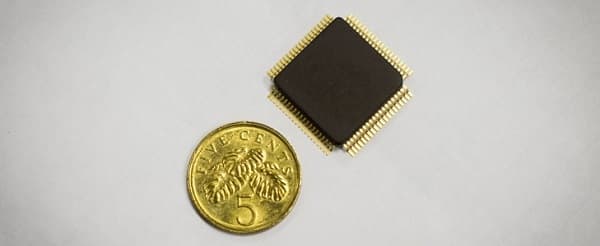Smart Chip Could Assist Neural Implants With Super Accurate Brain Signal Transmission
Members of a research team at Nanyang Technological University (NTU), Singapore, have developed a smart chip that can be paired with brain implants for efficient wireless transmission of signals from and to the brain, providing much-needed aid to patients of diseases like the Parkinson’s and impairments such as the paraplegia.
Led by Indian-born scientist Arindam Basu, the team has tested the chip on animal models and remarkable results have been obtained, including an accuracy of 95% in decoding brain’s signals to the hand and fingers.

In biomedicine today, neural implants need to be connected with by wires to an external device outside the body. This has obvious shortcomings. Even in prosthetic patients, the implant is wired to a computer system to decode brain signals and direct the artificial limb to move. The process is not only cumbersome, it also exposes the brain to risks of infections and influx of other undesirable elements. The smart chip would provide wireless transmission of brain data, while also ensuring accuracy.
Assistant professor at NTU’s School of Electrical and Electronic Engineering, Basu claims that the chip is as versatile as it innovative. It can process neural data with high efficiency as well as analyse complex data patterns. He regards the chip as a hundred times more efficient that current processing chips in the market.
Here is how it works. First, it receives in thousands, signals from the neural implants in the brain. It then decodes them and analyses them to comprehensible from. Subsequently, the signals are compressed the resultant it sent over to a small external receiver. The process also helps in detecting abnormal or unusual patterns during neural data transmission.
The smart chip appears both as a manifestation of and beneficiary for the Internet of Things (IoT). It could be readily used in compact medical wearable devices, such as portable ECG monitoring devices. The team is also pondering over ways to expand its applications into commercial products, like home sensor networks.
Source: #-Link-Snipped-#
Led by Indian-born scientist Arindam Basu, the team has tested the chip on animal models and remarkable results have been obtained, including an accuracy of 95% in decoding brain’s signals to the hand and fingers.

In biomedicine today, neural implants need to be connected with by wires to an external device outside the body. This has obvious shortcomings. Even in prosthetic patients, the implant is wired to a computer system to decode brain signals and direct the artificial limb to move. The process is not only cumbersome, it also exposes the brain to risks of infections and influx of other undesirable elements. The smart chip would provide wireless transmission of brain data, while also ensuring accuracy.
Assistant professor at NTU’s School of Electrical and Electronic Engineering, Basu claims that the chip is as versatile as it innovative. It can process neural data with high efficiency as well as analyse complex data patterns. He regards the chip as a hundred times more efficient that current processing chips in the market.
Here is how it works. First, it receives in thousands, signals from the neural implants in the brain. It then decodes them and analyses them to comprehensible from. Subsequently, the signals are compressed the resultant it sent over to a small external receiver. The process also helps in detecting abnormal or unusual patterns during neural data transmission.
The smart chip appears both as a manifestation of and beneficiary for the Internet of Things (IoT). It could be readily used in compact medical wearable devices, such as portable ECG monitoring devices. The team is also pondering over ways to expand its applications into commercial products, like home sensor networks.
Source: #-Link-Snipped-#
0
